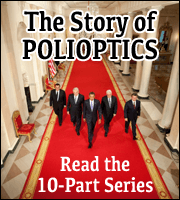Ken Vogel and Nick Confessore are our guests this week.
Guest host this week: Jeff Smith, New School professor and former Missouri State Senator
Show produced by Katherine Caperton.
Original Air Date: February 15, 2014 on SiriusXM “POTUS” Channel 124.
PoliOptics airs on POTUS on Saturdays at 8 am, 4 pm and midnight and on Sundays at noon and midnight.
Follow us on Twitter @Polioptics
Listen to the show by clicking on the bar above.
Show also available for download on Apple iTunes by clicking here
The first campaign manager of the modern era was Mark Hanna, who ran McKinley’s famous “front-porch campaign” in 1900. In many ways it was quite unlike from today’s presidential campaigns: McKinley made no pilgrimages to meet and greet voters in Iowa or New Hampshire, but rather greeted millions of voters from his front porch thanks to the free passes given by railroad companies looking for goodwill from a McKinley administration.
There was, however, one important similarity between that campaign of a century ago and today’s campaigns, one embodied by Hanna’s response when asked to explain McKinley’s win. “There were two keys to victory,” he said. “The first one was money. I can’t remember what the second was.” Indeed, Hanna had persuaded several of the so-called “robber barons” to donate millions of dollars towards a marketing campaign which produced millions of pamphlets and handbills promoting McKinley and trashing opponent William Jennings Bryan.
For decades after that, there were scant regulations on the financing of campaigns, and many of our presidents and aspiring presidents took advantage of this. For instance, as a young congressman seeking to revitalize the Democratic Congressional Campaign Committee, Lyndon Johnson literally received sacks of cash from Brown and Root CEO Herman Brown that he distributed to colleagues as a way to gather chits and build his own power base.
In the wake of Watergate, reformers passed some of the nation’s first campaign finance laws, limiting contributions to $1,000 each and requiring full disclosure. But soon, enterprising politicians found loopholes, including “soft money,” the unregulated contributions to political parties that led to accusations of President Clinton “renting the Lincoln bedroom” of the White House out in exchange for $50,000 soft money contributions during his 1996 re-election.
These revelations became one impetus for reformers to propose more stringent regulation, which culminated in the 2002 signing of McCain-Feingold, which banned both soft money and any coordination between independent groups and candidate campaigns.
Again, though, the law of unintended consequences went to work: soon, there was more money flowing into the system than ever, from ever more shadowy places. And many doubted campaign operatives’ claims that so-called independent expenditures were actually independent.
Although many pundits grappled with this new Wild West environment, no one was able to distill it quite as well as comedian Stephen Colbert. Colbert satirized the concept of independently operating Super PACs by plotting on air with Trevor Potter, former Federal Election Commission chairman, to transfer the reins of his amply-funded Super PAC so that it could support his looming presidential candidacy. Potter informed Colbert that anyone other than Colbert could run such a PAC, provided they did not coordinate on strategy:
“Well, I wouldn’t want to even create the appearance of skullduggery,” said Colbert, “but I think I know just the guy.”
Suddenly, Jon Stewart appeared on stage, and asked Potter if the fact that he and Colbert were business partners would prohibit him from running the PAC.
“Being business partners does not count as coordination, legally,” Potter replied, handing Stewart a single sheet of paper christening the new entity, “Definitely Not Coordinating with Stephen Colbert Super PAC.”
“Now that I have the Super PAC,” asked Stewart, “may I legally hire his current staff to produce these ads that will be in no way coordinated with Stephen?”
“Yes,” said Potter, “as long as they have no knowledge of Colbert’s plans.”
Colbert thought for a moment and concluded, “OK, from now on I’ll have to talk about my plans on my show and just take the risk that you might watch it.”
Colbert likely he had no idea that real-world events would quickly seem more surreal than his satire. For instance, just before his breakthrough victory in the South Carolina primary, Newt Gingrich met privately with benefactor Sheldon Adelson at Adelson’ s Las Vegas resort. Adelson and his wife had recently donated $11 million to a Gingrich-affiliated Super PAC. Gingrich and Adelson emerged from their meeting and insisted that they did not discuss campaign strategy. Days later, Adelson contributed another $5 million. Adelson actually donated more to the SuperPAC than Gingrich’s official presidential campaign committee raised during Newt’s entire candidacy.
Gingrich was not alone in relying on a single donor to keep his presidential campaign afloat – or in stretching the bounds of credulity regarding coordination. When Rick Santorum’s campaign could not afford a single television ad in the run-up to February 7 contests in Minnesota, Missouri, and Colorado, billionaire donor Foster Freiss stepped up to the plate with a seven-figure donation to Santorum-aligned Red, White, and Blue Super PAC, which ran ads that helped power Santorum to victory over Mitt Romney in all three states. And Freiss seemed even less concerned than Adelson about potential accusations of illicit coordination: while underwriting Red, White, and Blue’s ad campaign, Freiss traveled with Santorum on his campaign bus for 3 weeks.
Of course, these campaigns may well have avoided actual coordination. Savvy operatives – with the aid of election-law attorneys – argue that it is relatively easy to comply with the law even while achieving the ultimate goal of coordinating attacks on opponents. One method pioneered by the National Republican Congressional Committee in 2010 was to release advertising plans publicly, allowing independent groups to run their own advertisements in a way that would complement the NRCC’s ads. Although Democrats essentially ceded the Super PAC terrain to Republicans during the 2010 cycle, President Obama’ s wink and nod brought them onto the field in February 2011. Democrats quickly learned to “coordinate without coordinating” in many of the same ways Republicans did, even taking it to a new level: while John Lapp ran the Democratic Congressional Campaign Committee’s traditional campaign arm (a PAC bound by limited contributions), his wife Ali ran House Majority PAC (the Super PAC charged with an identical mission but able to accept unlimited contributions). In one striking product, the DCCC operation aired an ad attacking the Republican candidate for a New York congressional seat, followed almost immediately by a similar House Majority PAC spot. Though the ads cited the identical line from a Wall Street Journal article, Ali Lapp assured a reporter that she and her husband never discussed campaign strategy. “ John and I were much more excited about the serious progress our 2 ½ year old made in potty training that day,” she said, unconvincingly.
Unfortunately, it was a violation of this very law against coordination – to the tune of a somewhat less princely sum, estimated at $10,000-$25,000 – that ultimately led to a federal prison sentence of a year and a day for yours truly.
In any case, mega-donors like Adelson have made the days of $50,000 soft money donations seem positively quaint. This week we’ll be talking with reporters who wrote this week about two men who each committed to spend $100 million bucks on elections this year!
First, we’re joined by Ken Vogel, senior political reporter for Politico and the author of the only book with a title longer than Leibo’s recent best seller; it’s called Big Money: 2.5 Billion Dollars, One Suspicious Vehicle, and a Pimp—on the Trail of the Ultra-Rich Hijacking American Politics, and it chronicles the wild spending of the 2012 election. After the break, we talk with New York Times national political reporter Nick Confessore, who wrote a fantastic piece last week about Tom Steyer, the billionaire environmentalist who may be the left’s David Koch.


Leave a Reply